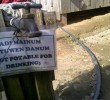Communist Party of the Philippines
Press Statement
14 January 2013
At the very outset, it was plain to see that there was no shootout in the killing of criminal lord Victorino Siman Atienza Jr. (“VicSiman”) and 12 others at a police-military checkpoint in Atimonan, Quezon on January 6. Over the next few days, it would also become clear that the rubout was carried out in connection with rivalries between two criminal syndicates over the control and expansion of jueteng operations in Southern Luzon.
The Quezon rubout further exposes the widespread politico-criminal network whose far-reaching web includes key officials of the Aquino government. It underscores the fact that rival syndicates use the police and military, including their top officials to advance their criminal interests.
VicSiman’s group was once part of the jueteng operations of the Rosario “Charing” Magbuhos group until he had a falling out with Magbuhos before 2010. He ultimately gained dominant control of jueteng operations in Southern Luzon through his network of politicians and police and military officials who frequented his Pink Star nightclub
and resort in Calamba, Laguna. He was killed together with a police superintendent, two other police officers, two Air Force elements in active service and several relatives and friends. They were reportedly transporting P100 million when ambushed.
The ambush against VicSiman was carried out by a police-military group led by Supt. Hansel Marantan, chief of the Regional Special Operations Group (RSOG) under the Calabarzon Regional Police Office. Marantan is the brother of Cenan “Tita” Dinglasan, who heads an upstart criminal syndicate that operates the government’s Small Town Lottery (STL) outlets in Laguna. It is a widely known fact that STL operations serve
as a front for jueteng operations. Marantan is a notorious police officer with links to jueteng and carnapping operations. He has been involved in at least three other rubout incidents since 2005 that have resulted in the killing of at least 40 suspected criminal elements.
However, the decision to undertake a violent, gangland-style takeover of jueteng and criminal operations in Southern Luzon was beyond the determination of an upstart crime group. This could only have been done with the blessing, nay authorization, of top national officials.
Dinglasan and Marantan are mere underlings of the national jueteng and illegal gambling network that regularly centralizes bribe money to Malacañang and its top military and police officials. They, however, also act as political kingmakers, serving as election funders of local and national candidates in exchange for political, police and military protection.
This is the same network that provided former president Joseph Estrada with payola money. The jueteng payola exposé ignited nationwide outrage and led to his ouster in 2001. The same network fell on Gloria Arroyo’s laps when she took over Malacañang. Arroyo’s close links to Central Luzon jueteng operators Macario “Bong” Pineda and his wife Lilia “Baby” Pineda are widely known.
It is quite apparent that the rubout of the VicSiman group was an operation that was tolerated, if not supported by the Aquino political ruling elite. As an intelligence officer of the PNP Calabarzon, Marantan is under the command of Police Director James Melad, head of the PNP Calabarzon. He also works with Supt. Glenn Dumlao, head of the Calabarzon Public Safety Battalion, who hatched the operations against the VicSiman group with the code name “Coplan Armado.” Malacañang has admitted that it was aware of Coplan Armado through a proposal submitted by Marantan and Dumlao seeking additional funding from the Presidential Anti-Organized Crime Commission (PAOCC) for the project.
The PAOCC is headed by Aquino’s Executive Secretary Paquito Ochoa. In a shrewd bid to steer Malacañang clear of any controversy that may ensue, the PAOCC officially did not provide additional funds for the project, but neither did it give the thumbs-down to it as a PNP case plan at the regional level.
Dumlao and Melad are notorious for their links to former police chief Panfilo Lacson, now a senator and close political ally of the Aquino regime. Melad was one of the police officers involved in the extrajudicial killing of 11 members of the Kuratong Baleleng criminal syndicate in 1995 as well as the subsequent elimination of witnesses. Dumlao, on the other hand, was involved in the 2001 abduction and killing of publicist Bubby Dacer and his driver Emmanuel Corbito, a dirty job widely considered to have been hatched also by Lacson, after Dacer caused the disclosure of footages showing then president Estrada hobnobbing with known gambling lords and other underworld figures.
Both Lacson and Dumlao went into hiding. Despite the preponderance of evidence and the nationwide furor that the case once stirred up, it was eventually dismissed under Aquino’s watch. Both Lacson and Dumlao surfaced in 2011 in a move facilitated by Aquino’s men. Dumlao was reinstated and appointed to the PNP-Calabarzon while Lacson returned to the Senate.
This intricate web connecting the reactionary political elite and police and military officers to criminal syndicates has already prompted anti-jueteng stalwart Bishop Oscar Cruz to cynically wonder aloud why Malacañang under Aquino has not included the campaign against the illegal numbers game among its priorities. At one point, one of Aquino’s uncles, Antonio “Tony Boy” Cojuangco openly admitted to having told Bishop Cruz to go slow in his exposés. This was after Bishop Cruz identified Aquino’s fellow gun enthusiast and classmate Undersecretary Rico Puno, and former police chief Jesus Verzosa, as Aquino’s bagmen receiving jueteng payola on the national level. Using
their police network, Puno and Verzosa linked up with the jueteng and other criminal syndicates and made arrangements for the centralization of payola money in behalf of the newly installed Malacañang overlord.
Is it any wonder then why Aquino had his key officials facilitate Lacson’s comeback? Or why Lacson tried to get Puno off the hook when he was summoned to a Senate hearing investigating the jueteng payola? Even the blind can see that jueteng operations continue to thrive because the political ruling elite pockets hundreds of millions of
pesos of payola money.
The revolutionary forces of the Filipino people have long stood firmly against the operations of the jueteng syndicate. Wherever the people have established their democratic political authority in the guerrilla zones, jueteng and other criminal operations have been put to a stop. They drive away gambling operators, whether legal or illegal, that fleece the people and take advantage of their socio-economic desperation. The revolutionary forces have been waging a counter-education campaign to encourage the people to reject and drive away the criminal syndicates behind these operations and instead promote production and engagement in revolutionary struggles to fight the oppressive and exploitative system that buries them deep in poverty.
The revolutionary forces urge the Filipino people to expose the politico-criminal web that permeates the entire rotten reactionary state — from the local government, police and military units all the way to their big bosses in Camp Aguinaldo, Camp Crame and Malacañang. The revolutionary forces call on the foot soldiers and rank-and-file policemen, including those used in the Quezon rubout, to stand up and refuse to be further used in the operations of the criminal syndicates being run or protected by their generals.
The Filipino people demand that politicians and other people in the know, stand up and expose the criminal operations under the Aquino regime. They can link with the revolutionary forces in order to be extended the necessary assistance. The guerrilla zones will provide safe haven to anyone willing to break away from the criminal
syndicates and expose their operations.










